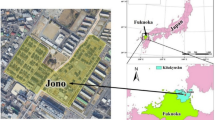Abstract
In this study, energy optimization of multiple electrical systems in off-grid mode with optimal participation of the storage systems is investigated. Multiple renewable sources, including solar cells, diesel generators, wind turbines, and backup storage systems, are utilized to feed the demand with high reliability. The load demand is divided into AC and DC loads on the consumers' sides. Then, by the mathematical nonlinear quadratic programming approach and heuristic approach, the optimal power generation in the generation side and consumers is implemented with minimum cost and the highest level of reliability. The following assesses the impact of batteries storage system on obtaining the optimal operation level. Finally, the proposed optimization algorithm is applied in MATLAB software with numerical simulation in the different operation modes of the energy systems to show the optimal energy generation.








Similar content being viewed by others
References
Abedinia O, Lu M, Bagheri M (2019) An improved multicriteria optimization method for solving the electric vehicles planning issue in smart grids via green energy sources. IEEE Access 8:3465–3481
Ahmadi Z, Haghighi M, Validi Z (2020) A novel approach for energy optimization in distributed databases in wireless network applications. J Manag Account Stud 8(3):50–55
Bilil H, Aniba G, Gharavi H (2016) Dynamic appliances scheduling in collaborative microgrids system. IEEE Trans Power Syst 32:2276–2287
Chamandoust H (2018) Economic scheduling of microgrid based on energy management and demand response. Electric Control Commun Eng 14(2):100–107. https://doi.org/10.2478/ecce-2018-0012
Ding X, Sun W, Harrison GP, Lv X, Weng Y (2020) Multi-objective optimization for an integrated renewable, power-to-gas and solid oxide fuel cell/gas turbine hybrid system in microgrid. Energy 213:118804
Elhassan ZA (2023) Utilizing homer power optimization software for a techno-economic feasibility, study of a sustainable grid-connected design for urban electricity in, Khartoum. Metall Mater Eng 29(1):101–118. https://doi.org/10.56801/MME988
Fambri G, Diaz-Londono C, Mazza A, Badami M, Sihvonen T, Weiss R (2022) Techno-economic analysis of Power-to-Gas plants in a gas and electricity distribution network system with high renewable energy penetration. Appl Energy 312:118743
Han L, Yu H-H (2023) An empirical study from Chinese energy firms on the relationship between executive compensation and corporate performance. Nurture 17(3):378–393. https://doi.org/10.55951/nurture.v17i3.356
Hou T, Fang R, Yang D, Zhang W, Tang J (2022) Energy storage system optimization based on a multi-time scale decomposition-coordination algorithm for wind-ESS systems. Sustain Energy Technol Assess 49:101645
Huang Y, Wang Y, Liu N (2022) A two-stage energy management for heat-electricity integrated energy system considering dynamic pricing of Stackelberg game and operation strategy optimization. Energy 244:122576
Jamalzadeh F, Mirzahosseini AH, Faghihi F, Panahi M (2020) Optimal operation of energy hub system using hybrid stochastic-interval optimization approach. Sustain Cities Soc 54:101998
Jiang A, Yuan H, Li D (2021) Energy management for a community-level integrated energy system with photovoltaic prosumers based on bargaining theory. Energy 225:120272
Kaveh A, Vazirinia Y (2020) Smart-home electrical energy scheduling system using multi-objective antlion optimizer and evidential reasoning. Scientia Iranica 27:177–201
Khalid A, Javaid N, Guizani M, Alhussein M, Aurangzeb K, Ilahi M (2018) Towards dynamic coordination among home appliances using multi-objective energy optimization for demand side management in smart buildings. IEEE Access 6:19509–19529
Lak Kamari M, Isvand H, Alhuyi Nazari M (2020) Applications of multi-criteria decision-making (MCDM) methods in renewable energy development: a review. Renew Energy Res Appl 1(1):47–54
Mazzeo D, Oliveti G, Baglivo C, Congedo PM (2018) Energy reliability-constrained method for the multi-objective optimization of a photovoltaic-wind hybrid system with battery storage. Energy 156:688–708
Shakibi H, Afzal S, Shokri A, Sobhani B (2022) Utilization of a phase change material with metal foam for the performance improvement of the photovoltaic cells. J Energy Storage 51:104466. https://doi.org/10.1016/j.est.2022.104466
Tazvinga H, Zhu B, Xia X (2014) Energy dispatch strategy for a photovoltaic–wind–diesel–battery hybrid power system. Sol Energy 108:412–420
Tazvinga H, Zhu B, Xia X (2015) Optimal power flow management for distributed energy resources with batteries. Energy Convers Manage 102:104–110
Zhang W, Maleki A (2022) Modeling and optimization of a stand-alone desalination plant powered by solar/wind energies based on back-up systems using a hybrid algorithm. Energy 254:124341
Zhang W, Maleki A, Rosen MA (2019) A heuristic-based approach for optimizing a small independent solar and wind hybrid power scheme incorporating load forecasting. J Clean Prod 241:117920
Author information
Authors and Affiliations
Contributions
BX: formal analysis, methodology, software, language review. JW: writing—Original draft preparation, conceptualization, supervision, project administration.
Corresponding author
Ethics declarations
Conflict of interest
The authors declare no competing of interests.
Additional information
Publisher's Note
Springer Nature remains neutral with regard to jurisdictional claims in published maps and institutional affiliations.
Rights and permissions
Springer Nature or its licensor (e.g. a society or other partner) holds exclusive rights to this article under a publishing agreement with the author(s) or other rightsholder(s); author self-archiving of the accepted manuscript version of this article is solely governed by the terms of such publishing agreement and applicable law.
About this article
Cite this article
Xu, B., Wang, J. Optimal energy optimization of the integrated hybrid energy system considering storage system performance. Multiscale and Multidiscip. Model. Exp. and Des. 7, 705–710 (2024). https://doi.org/10.1007/s41939-023-00239-9
Received:
Accepted:
Published:
Issue Date:
DOI: https://doi.org/10.1007/s41939-023-00239-9




